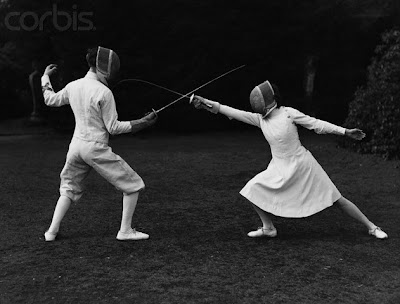
So we're coming up on what some people have decided is to be
"Out Yourself as a Pagan" Day. And, of course, this effort is motivated by good ideas.
We all know the stories about, for example,
homophobes who were transformed by the discovery that their child, next-door neighbor whom they really liked, coworker, etc. was gay. It's easy to hate an abstract "Other" and more difficult to maintain your prejudices against someone you know and like.
And the
more of us that there -- demonstrably -- are, the more difficult it becomes to pretend that we don't exist, that only angsty teen-age girls practice Witchcraft (as if that were a reason to de-legitamize it), that Witches are all man-hating feminists with granola stuck in their teeth, that only oddball failures become Witches, etc.
Further, there's the simple relief and authenticity that can come from not having to hide a part of who you are. I love it that my Son, DiL, and G/Son, Landscape Guy, and political friends know that I'm a Witch; it's nice that I don't have to hide an important part of my life from them. I like being able to say to Landscape Guy, "I need the stonework around the firepit large enough to accommodate a circle of women." I like being able to say to political friends, "As a Witch, I can never go along with any policy that will lead to eliminating wild spaces."
So, yes, I get the possible value of a "Coming Out" Day for Pagans, even if it's not associated with
Pagan Pride Day, which generally comes in October.
However, my formative years were heavily influenced by the union movement (yes, I am that old), and I've searched in vain for any indication that the organizers of "Out Yourself as a Pagan Day" have set up the equivalent of a
Strike Fund to pay the expenses of those who get fired for outing themselves or the legal fees of parents who find themselves on the downside of a custody battle. Strike Funds are what serious movements do. I think it's lovely to invite others to take risks, but I am old and cynical enough to understand that people really do lose jobs, leases, custody, etc. when they out themselves. And outing yourself to even one person, especially in today's world of Social Media and internet files that never die, is, at the least, opening the possibility that you will be outed to the entire world.
I've said before that broom closet decisions are personal decisions and that I'm not in a position to make them for even one other Witch. At its core, for me, Witchcraft demands Honor and that means that I completely and unwaveringly respect each Witch's own decisions concerning where hir broom closet begins and ends. I have friends who make their living as public Pagan leaders. I have friends who are "out" in their federal government or nonprofit jobs, but who would fall on their athames before causing their fundie families the pain that would be caused if they "came out" as Witches. And I respect every shade of grey in between. And while my family, close friends, and select neighbors know that I'm a Witch, I could become less effective at and ultimately lose my job if people in that world knew about my religion.
I'll also say that, as someone who has been on the receiving end of TMI concerning other people's (fundie xian I was next to in first-class all the way from SF back to DC, recently, I'm looking at you) religious experiences, I often think that the world would
"go round a good deal faster" if casual and business acquaintances were less, rather than more, "out" about their religions. There are (a few) times when religion naturally comes up in the conversation and there are times when you're forcing the issue and requiring others to participate in your own ego needs in ways they'd likely rather not. I don't like it when people force conversations with me about their religions and I don't feel any need to do that to others.
Which is all a rather long-winded wind-up to proposing a few suggestions for those who are going to be interacting with the media during "Out Yourself as a Pagan" Day.
1. The reporter is not your friend. S/he does not want to help you get your message out.
Hir job is to sell Viagra. The more sensationalistic a story s/he can turn in, the more Viagra sales. Every word that you say to the reporter needs to be informed by this decision.
2. You need to become crystal clear about your objective. Why are you talking to the press at all? Can you put the message that you want to get out into one, short, pithy sentence? If not, don't talk to the media. Let someone else. Spend as much time as it takes to get your message into one, short, pithy sentence. Lawyers sometimes spend all day writing the opening sentence for a brief or oral argument. If you don't have the time to devote to this effort, then don't talk to the media.
3. My blog is a broken record on this topic, but I'm going to remind you that if you attempt to negate a frame, you reinforce that frame. If you've read even three books on Witchcraft, you've come across the notion that you don't craft a spell to focus on what you don't want. So, for example, you don't write affirmations that say that you're banishing sloth and loneliness from your life. You write affirmations that say that you bring Fire and the ability to focus as well as the ability to attract love into your life. Think of Richard Nixon announcing, "I am not a crook," or Christine O'Donnell saying, "I'm not a witch; I'm you." Today, when people think of Nixon, they think of a crook and when they think of O'Donnell, they remember that she "dabbled into Witchcraft." If you say, "Witches are not evil old women with green skin who do spells to harm people," the next time people think of Witches, they will think of . . . .
The message here is that you MUST NOT begin your interview by telling the reporter that, "Witches don't eat babies," or that "Pagans are not Satanists," or that "We don't really do evil spells." Negating a frame reinforces it. If you give the Viagra salesperson a sound-bite about not being a Satanist or not eating babies, I guarandamntee you, those are the six seconds of your entire, 90 minute conversation, that will show up on tv/on the radio/in print, etc. Really. Trust me. And you are not smarter than the reporter. The reporter does this everyday of hir life, while you may talk to the media a dozen or so (if you're v active) times in your life. If you say it, they will use it to (1) sell Viagra and (2) make you look like an idiot. You are playing on their field. Don't give them ANYTHING that you don't want them to use.
4. "Out Yourself as a Pagan" Day has even more pitfalls, IMHO, in terms of media communication, than does Pagan Pride Day. While even fairly mainstream religions may have Pride Days (DC has a great Greek Orthodox festival, for example), the entire notion of "coming out" brings up the issue of why anyone feels the need to stay in the broom closet in the first place. Discussing prejudices against Pagans (the reason some Pagans stay in the closet) without slipping into the whole "We're coming out because some folks think we eat babies, but we don't," (which winds up on the evening news clipped to "We eat babies"), requires a level of media-savvy that I don't think many of us possess.
So if you are going to participate publicly in this event, I urge you to have one, pithy, quotable sentence about why you are are coming out. "I want the whole world to know that a [doctor, lawyer, computer technician, architect, fireman, neighborhood volunteer, librarian] can also be a Pagan." "I am proud of the ancient traditions of Paganism that brought us democracy, philosophy, science, sustainable agriculture, etc., and I want to share that with my community." "I am proud of who I am and I wanted to participate in this nationwide event to share that with my friends and neighbors."
What will you say if the reporter asks you, "But what about the people who say that Witches eat babies?" You need to not only have your answer to this question written out, you need to practice with a friend (preferably on video, if possible) how you will answer this question and all of its variations. If you don't have time to do this, you don't have time to be a public spokesperson. The objective here is NOT to give a detailed, nuanced, thorough answer to the Viagra salesperson's question. The goal here is to get away from negating a negative frame and to IMMEDIATELY GET BACK to the message you've decided that you want to get out. "Sensationalism aside, Pagans have a long and proud history of providing civilization with important institutions such as democracy and philosophy that . . . ." "What I want to focus on is how modern Pagans can be important in a post-peak-oil world, especially given all we've learned over the ages about respecting the cycles of nature. For example, next month, my group will collect seeds at Ostara to donate to a local community garden, where, last year we . . . . " "As I mentioned, this Summer, MYGROUPX will be holding seminars to teach anyone who's interested the basics of Witchcraft and you can register for these classes at www.mygroupx.com or you can . . . ."
Go spend an afternoon watching, say, Rachael Maddow or Fox "News" and see how conservatives respond to every question that comes up by ignoring the question and repeating the message that they want to get out. It's a learned skill and you can learn it. Buy and read
George Lakoff's
Don't Think of an Elephant. Role play with a friend. You may not like conservatives, but they have been wildly successful at getting their message out and at framing (death tax, partial birth abortion, America is a xian nation, etc.) the issues that matter to them. If you're smarter than they are, why haven't you been more successful at getting your message out?
I'll leave to each Pagan's own conscience and decison-making process, whether, when, and how to come out. I've already made my own decisions on those issues. But I will beg each Pagan who decides to come out to the media to do it in a way that doesn't harm the rest of us. Dealing with the media is a skill and it can be learned. Or it can be royally botched. You owe it to all of us not to botch it, esp. when it's so easy to just shut up until you know what you're doing.
5. Paganism, Wicca, Faerie, etc. are religions. They are not faiths. Xianity and Islam are based, to a large extent, upon "faith." This is the notion that "believers" have "faith" in, for example, Jesus or Mohamed, and that they accept "on faith" certain precepts of the religion. Even when one's rational mind might cause one to "doubt" certain tenants of such "faiths," one is encouraged to "have faith" in one or another promises of the featured "faith." Not all religions are "faiths." Paganism is an umbrella term that encompasses a variety of religions, including, for example, Wicca, Druidism, Asatru, etc. None of these are exclusively "faiths," but they are all religions. So when you talk to the Viagra salespersons, don't describe Paganism as a "faith," or as a (tickles back of throat) "faith community." Describe it as what it is: a religion. My religion has nothing to do with faith and everything to do with direct experience of divinity/nature/nature/divinity/etc. If you're going to speak for all of us, speak for all of us, including the majority of us who have zero faith and 100% experience. Why legitimize the idea that the only valid religions are those based upon faith?
May the Goddess guard those who come out. May the Goddess guard those who practice privately. May all of us show Honor to all of the rest of us. So mote it be.
Picture found
here.

























